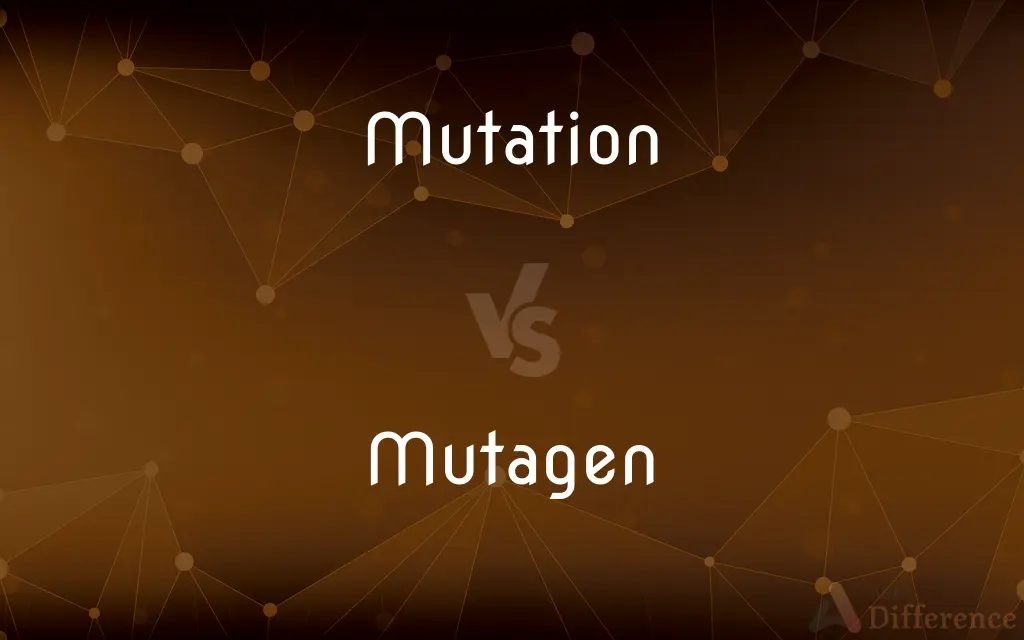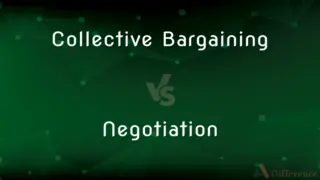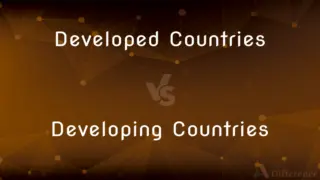Mutation vs. Mutagen — What's the Difference?
By Tayyaba Rehman — Published on October 30, 2023
A Mutation is a change in DNA sequence; a Mutagen is an agent that induces that change. Both relate to genetic alterations, but one is the result while the other is a cause.

Difference Between Mutation and Mutagen
Table of Contents
ADVERTISEMENT
Key Differences
Mutation and Mutagen, though intertwined in the realm of genetics, serve different functions. A Mutation refers to a change, either by deletion, insertion, or substitution, in the sequence of an organism's DNA. This alteration can occur naturally due to errors in DNA replication or can be induced by external agents. Mutations can lead to variations in traits, which may be beneficial, neutral, or detrimental.
On the other hand, a Mutagen is an external agent that induces mutations. Mutagens can be physical entities like radiation or chemical substances that interact with DNA in a way that causes it to change. While a Mutation is the end product of a genetic change, the Mutagen is often the instigator of this change.
It's crucial to understand the distinction between these two concepts. While every Mutagen will cause a Mutation, not every Mutation is caused by a Mutagen. Some mutations arise spontaneously without any external influence. Yet, when a Mutagen is involved, it increases the rate at which these genetic changes occur.
Both Mutation and Mutagen have significant implications in various fields. Mutations play a pivotal role in evolution, as they provide the genetic variation upon which natural selection can act. Mutagens, meanwhile, have essential implications in health and safety. Exposure to certain mutagens can increase the risk of diseases like cancer.
In summary, while Mutation refers to the actual change in genetic material, Mutagen pertains to the agent causing that change. Recognizing the difference aids in understanding genetics, evolution, and health risks associated with certain agents.
ADVERTISEMENT
Comparison Chart
Definition
A change in the DNA sequence
An agent that induces a change in the DNA sequence
Origin
Can be natural or induced
External agents (chemical or physical)
Role
The outcome/result of genetic alteration
The cause of genetic alteration
Impact
Can be beneficial, neutral, or detrimental
Typically increases the risk of mutations
Example
Genetic variations in a population
Radiation, certain chemicals
Compare with Definitions
Mutation
A Mutation is a change in an organism's DNA sequence.
The butterfly's unique colors are due to a mutation.
Mutagen
A Mutagen is an agent that induces genetic mutations.
Prolonged exposure to the mutagen led to genetic changes in the cells.
Mutation
A Mutation can result from errors during DNA replication.
The gene mutation occurred naturally during cell division.
Mutagen
Mutagens can be chemical substances.
Tobacco contains compounds that act as mutagens.
Mutation
A Mutation can lead to variations in traits or characteristics.
The mutation caused the plant to produce blue flowers.
Mutagen
Mutagens can be physical, like radiation.
Ultraviolet light is a known mutagen that can damage skin cells.
Mutation
A Mutation can be hereditary, passed to offspring.
The family carries a mutation linked to a rare disease.
Mutagen
Mutagens cause changes in the DNA structure.
The chemical acted as a powerful mutagen, altering the DNA of the organism.
Mutation
Mutations can be spontaneous or induced.
The sudden appearance of a new trait indicated a spontaneous mutation.
Mutagen
Mutagens can increase the risk of diseases.
Exposure to certain mutagens is linked to higher cancer risks.
Mutation
The act or process of being altered or changed.
Mutagen
An agent, such as a chemical, ultraviolet light, or a radioactive element, that can induce or increase the frequency of mutation in an organism.
Mutation
An alteration or change, as in nature, form, or quality.
Mutagen
Any agent or substance that can cause genetic mutation.
Mutation
A change in the nucleotide sequence of the genome of an organism or virus, sometimes resulting in the appearance of a new character or trait not found in the parental type.
Mutagen
A chemical compound or other external influence (such as ionizing radiation) which causes mutations{3}.
Mutation
The process by which such a change occurs, either through an alteration in the nucleotide sequence coding for a gene or through a change in the physical arrangement of the genetic material.
Mutagen
Any agent (physical or environmental) that can induce a genetic mutation or can increase the rate of mutation
Mutation
The nucleotide sequence, trait, or individual that results from such a change.
Mutation
A change affecting a sound or a class of sounds, such as back vowels or plosive consonants, through assimilation to another sound, as in the process of umlaut.
Mutation
A change affecting a sound or a class of sounds that is conditioned by morphological or syntactic factors rather than purely phonological factors, as in Irish, where certain words cause the lenition of the initial consonants of the following word.
Mutation
Any alteration or change.
Mutation
(genetics) Any heritable change of the base-pair sequence of genetic material.
Mutation
A mutant.
Mutation
(linguistics) An alteration a particular sound of a word, especially the initial consonant, which is triggered by the word's morphological or syntactic context and not by its phonological context.
Mutation
A group of thrushes.
Mutation
Change; alteration, either in form or qualities.
The vicissitude or mutations in the superior globe are no fit matter for this present argument.
Mutation
Gradual definitely tending variation, such as may be observed in a group of organisms in the fossils of successive geological levels.
Mutation
As now employed (first by de Vries), a cellular process resulting in a sudden inheritable variation (the offspring differing from its parents in some well-marked character or characters) as distinguished from a gradual variation in which the new characters become fully developed only in the course of many generations. The occurrence of mutations, the selection of strains carrying mutations permitting enhanced survival under prevailing conditions, and the mechanism of hereditary of the characters so appearing, are well-established facts; whether and to what extent the mutation process has played the most important part in the evolution of the existing species and other groups of organisms is an unresolved question.
Mutation
A variant strain of an organism in which the hereditary variant property is caused by a mutation{3}.
Mutation
(biology) an organism that has characteristics resulting from chromosomal alteration
Mutation
(genetics) any event that changes genetic structure; any alteration in the inherited nucleic acid sequence of the genotype of an organism
Mutation
A change or alteration in form or qualities
Common Curiosities
Are all mutations harmful?
No, mutations can be beneficial, neutral, or detrimental.
How do mutagens cause mutations?
Mutagens interact with DNA, leading to changes in its sequence.
Can all mutations be attributed to mutagens?
No, mutations can arise spontaneously without the influence of mutagens.
What is a Mutation?
A Mutation is a change in an organism's DNA sequence.
What is a Mutagen?
A Mutagen is an external agent, either chemical or physical, that induces genetic mutations.
Can mutations be reversed?
While some can be repaired by cellular mechanisms, many mutations are permanent.
Can mutations be beneficial?
Yes, some mutations can confer advantages to organisms.
What's the link between mutagens and cancer?
Some mutagens can induce mutations that lead to the uncontrolled growth of cells, resulting in cancer.
Are all mutagens harmful?
Many are harmful, but not all mutagens lead to negative health outcomes.
Can exposure to a mutagen guarantee a mutation will occur?
No, but it increases the likelihood of mutations.
Are mutations always visible or noticeable?
No, some mutations don't result in observable changes.
How can one limit exposure to harmful mutagens?
By reducing exposure to known mutagens, like using sunscreen for UV protection.
Can mutations be passed on to future generations?
Yes, if mutations occur in reproductive cells, they can be inherited by offspring.
What's an example of a natural mutagen?
Ultraviolet radiation from the sun is a natural mutagen.
How do mutations relate to evolution?
Mutations provide genetic variation, which is essential for evolution through natural selection.
Share Your Discovery

Previous Comparison
Collective Bargaining vs. Negotiation
Next Comparison
Developed Countries vs. Developing CountriesAuthor Spotlight
Written by
Tayyaba RehmanTayyaba Rehman is a distinguished writer, currently serving as a primary contributor to askdifference.com. As a researcher in semantics and etymology, Tayyaba's passion for the complexity of languages and their distinctions has found a perfect home on the platform. Tayyaba delves into the intricacies of language, distinguishing between commonly confused words and phrases, thereby providing clarity for readers worldwide.












































